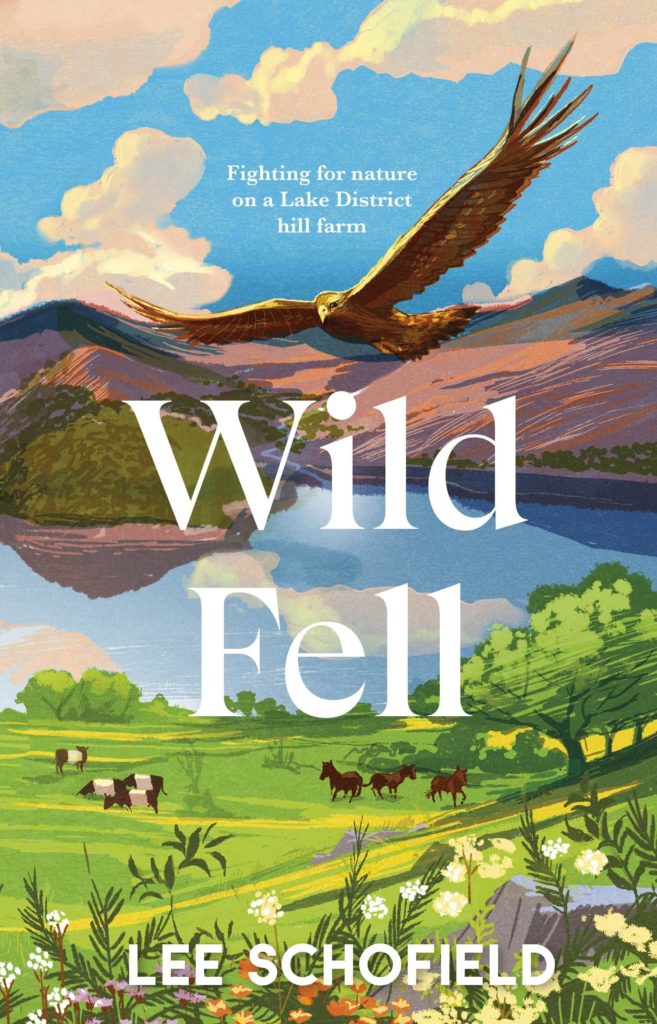Karen Lloyd reviews Lee Schofield’s ‘Wild Fell’: a document of the fight to restore the landscape of the Lake District.

In 2017 the Lake District National Park was designated a World Heritage (WH) site under the ‘cultural landscapes’ category. A significant condition of the inscription was the preservation of the ‘traditionally’ farmed upland landscape. One of the issues that Lee Schofield addresses in Wild Fell is to ascertain exactly how ‘traditional’ some of these farming methods actually are. Go back merely 60 years, he discovers, and our experience of and connection with the land was through a far richer and more diverse set of habitats; habitats subsequently lost under the hammer blows of intensive monoculture. Listening to some of the voices enunciating those losses (through a Cumbria Wildlife Trust oral history project) Schofield tells us, is ‘haunting and heart-breaking.’ Many of those losses are also directly attributable to EU payment systems that, however unwittingly, incentivised farmers to forget, as Wordsworth would have it, the relationship between nature, native and environment.
It is no accident that the cover illustration of Wild Fell has a golden eagle soaring over a reimagined Haweswater. But how to return this apex bird to our skies? ‘In order to look up,’ Schofield writes, ‘we must first look down.’ This looking down includes the recognition that collectively we have become ‘plant blind,’ and that regaining this connection is key to understanding ‘the importance of plants in the biosphere, and in human affairs.’ Most of the 19 million or more tourists who visit the Lakes annually believe it to be a wild place. Mostly of course, it is not. The loss of biodiverse habitats across the Lakes took place through the monoculture of sheep grazing, yet this is the very thing that WH and its supporters seek to preserve — even now, against the tsunami of evidence that we lose biodiversity at our peril.
The RSPB have been present in Haweswater since the 1970s, when they first began to monitor England’s now lamented golden eagle territory. The RSPB’s partnership with landowner United Utilities developed further in 2012 with the lease of four hill farms around this and the neighbouring valley. Here are some of the very last English remnants of Atlantic oak woods, which are a diverse ecosystem, but with surrounding fellsides sheep grazed they were also largely devoid of wildlife. As farm manager and ecologist, Schofield and his team set about finding a solution to ‘one of the great environmental conundrums’; that of rebalancing farming and nature. Rivers are re-wiggled, given back their ‘sinuosity,’ and hey presto, the salmon return. Loosed from their previously canalised trenches, flooding rivers deliver silt enrichment to the surrounding meadows and create one of the richest botanical habitats in the world. But more than this, rare wildflowers bloom again on the fellsides, the soils absorb more rain, and balance begins to be restored.
Schofield’s vision also accommodates other locations as exemplars of landscape restoration and management, from the Border’s Carrifran woodlands to Norway’s Fidjadalen (where sheep grazing and wildflowers go hand in hand), Duncan Halley’s restoration work in southern Norway and the alpine meadows of St Ursus in Italy. Should we choose to, it is abundantly clear that the UK — and significantly, the Lake District — can learn crucial lessons from places where birdsong and the buzz of pollinators speak louder than rhetoric. Contrast what is happening in those places against the mindset of a UNESCO steering group who, during a visit to the RSPB holdings said — and to Schofield’s face — that Haweswater was one of “a number of ‘warts’ on the face of the potential World Heritage site.” Such was the denial of nature as culture that Schofield had to ask if he had heard correctly. He had. Yet, even against such doctrinaire opposition, Schofield’s narrative is abundantly clear-sighted and measured.
Wild Fell invites us to recognise that through the simple expedient of working with rather than against nature, we also reawaken a greater sense of ourselves and our place in the locale; it is absolutely the book that needed to be written about the Lake District. Under his nuanced exposition, Schofield cuts through the white noise and leads us towards a landscape that is alive with possibilities and where those plants and pollinators, birds, fish and animals are all ready and waiting; all we need to do is to decide that’s how we want it to be. Like this, he foresees, that icon of the wild, the golden eagle, may yet return to our skies.
*
Published by Doubleday, ‘Wild Fell’ is out now and available here (£18.60).
Karen Lloyd is the award-winning author of ‘The Gathering Tide’, ‘The Blackbird Diaries’ and ‘Abundance: Nature in Recovery’. Follow her on Twitter here.